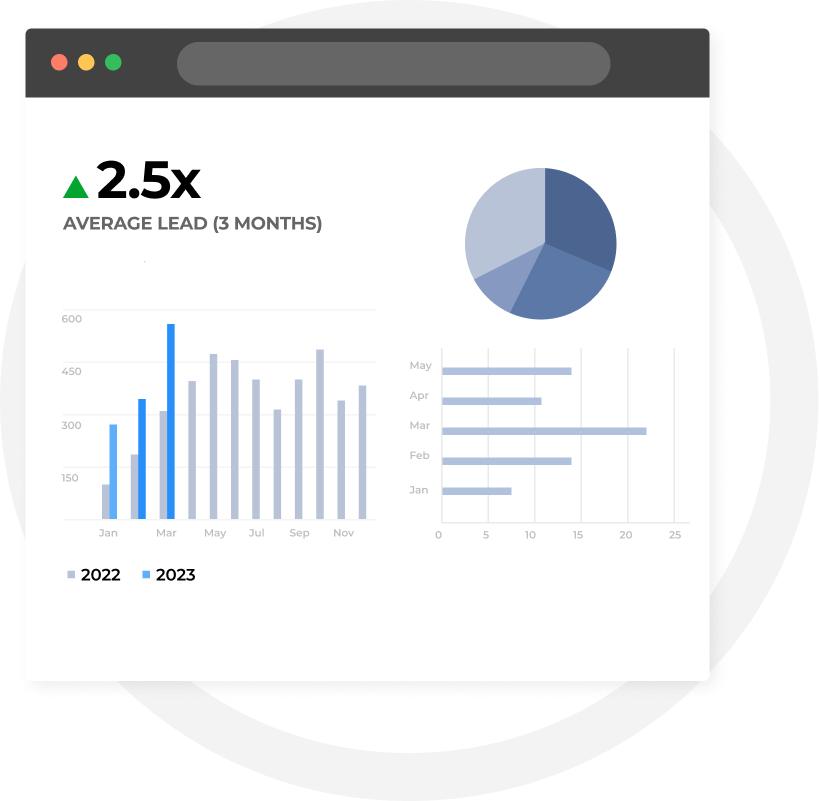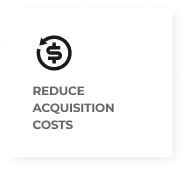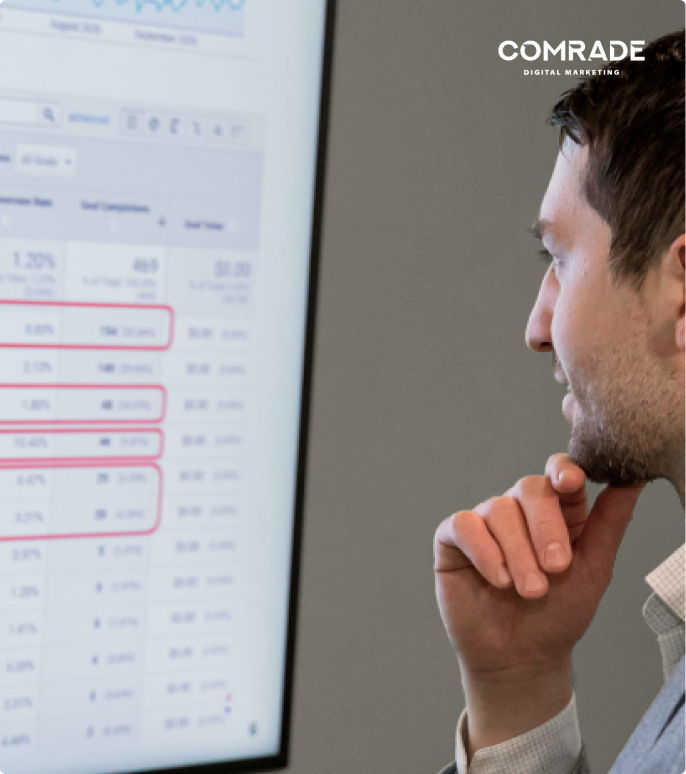Is SEO Worth It for Ecommerce?
Consumer trust is built through a strong online presence. Today’s buyers judge the quality of your eCommerce website as a benchmark for your products and services.
A robust digital presence provides affordable and effective marketing. It’s the easiest method to get your target audience interested in your brand and convert them into customers.
However, it’s not that simple. There are millions of eCommerce platforms online, and probably thousands in your niche. This is where eCommerce SEO can increase customer awareness, strengthen your brand and help you leapfrog over the competition.
Having a great website isn’t enough. Without SEO, it won’t rank and will be invisible to your target audience, resulting in significant revenue loss.
Take our client, The Kraff Eye Institute. Despite being well-known, they had a poor online presence and were losing out on sales. Working with us increased their targeted traffic by 861%!

Similarly, American Tent, manufacturers and suppliers of high-quality tents, wanted to improve their leads. We optimized their website and marketing assets with 181 targeted keywords. Thanks to SEO, they increased their leads by 517%!
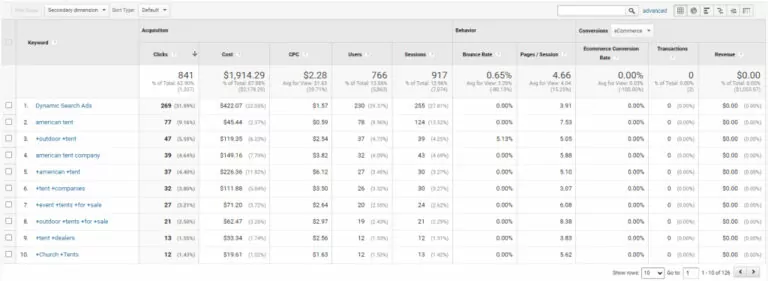
As you can see, an SEO strategy improves how your website operates. It allows search engines to rank it properly, so potential customers see and purchase your products and services.
How Our Ecommerce SEO Gets Results
In a nutshell: SEO is a process, not a one-time project. As an eCommerce SEO agency, there are several steps we perform to ensure your SEO campaign is set up properly and executed efficiently over time, which include:
- Analytic tools implementation
- Technical SEO and eCommerce platform audit
- Custom eCommerce SEO strategy development
- Product page optimization
- Keyword Research
- Content strategy
- Link building
- UI\UX audit and continuous improvement
Start With Analytics Tracking
On a practical level, we can’t optimize eCommerce businesses if we don’t know their current digital marketing status. So, we start by analyzing what’s already there to identify strengths, weaknesses, opportunities, and areas for improvement.
With eCommerce analytics, we measure user behavior, performance trends, and ROI. Our clients hire us to deliver results; thus, analytics helps us show ROI and make best the decisions to increase website traffic and sales.
We constantly monitor analytics to gauge how much client acquisition costs, which marketing platforms are most profitable, and what types of content marketing and paid ads your target audience responds to.
Google Analytics
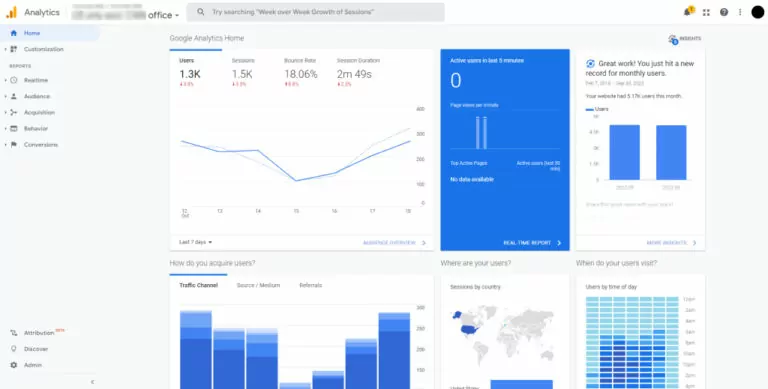
Nearly 40 million eCommerce sites use Google Analytics to collect, analyze and sort eCommerce website data. Comrade utilizes it to make educated and strategic marketing decisions based on real-time customer feedback.
As a high-performance SEO company, we rely on data to build a solid search engine optimization plan. Analytics monitors growth and conversion rates, giving us an in-depth look at website performance, so we can deliver better user experiences and results.
Google Search Console
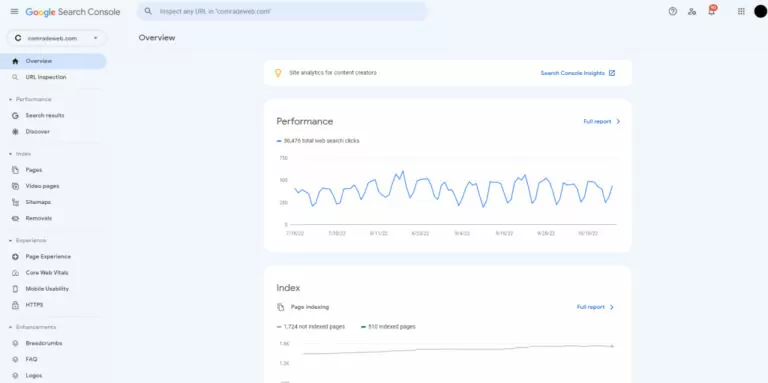
While Google Analytics is user-orientated, Google Search Console is search-engine focussed offering free tools and insights to improve online visibility and presence. We use it to monitor, maintain and troubleshoot eCommerce websites.
Google Search Console analyzes eCommerce websites the same way as Google bots, so if there are any issues with servers, security, link structure, or malware, we can resolve them immediately, maintaining website health.
How Do Ecommerce Platforms Incorporate SEO?
These days most eCommerce platforms let merchants perform SEO-related tasks directly from their dashboards or page editors. Some even have SEO plugins that allow you to change page titles, include relevant keywords, and select mobile-friendly templates for increased optimization.
However, some of these are limited and do not provide the full scope of SEO tools necessary to take your eCommerce brand to the level. The inability to directly edit a website’s HTML can negatively impact SEO and analytic capabilities, which is why we always start each project with an eCommerce SEO audit to understand what those limitations are and if we can work around them.
What Type of Ecommerce SEO Strategy Provides Results?
Customization is an integral part of your eCommerce strategy. A B2B business has different needs from a B2C business, as does a local store compared to an international one. Location and customer differences affect keywords, content strategy, and SEO tactics.
For instance, service-based businesses operating in one location would need an aggressive local SEO strategy to satisfy users’ queries nearby. However, a multinational B2b manufacturing conglomerate likely operates in several markets and requires a comprehensive global content marketing strategy that may include different languages.
Hence, we take the time to learn about our eCommerce SEO clients’ unique needs to develop customized SEO strategies.
Product Page Optimization
Effective product pages instantly convey the value proposition of a featured product. They show your potential customers what your product looks like and provide important details that convince them it’s something they must buy.
Because consumers cannot physically touch and see the products, we have to make your product pages work extra hard at convincing them to make online purchases. This includes having carefully placed high-quality images and videos that showcase products from multiple angles, clear calls to call action, and customer testimonials.
Product Description Optimization

When eCommerce companies copy and paste generic product descriptions supplied by manufacturers, they lower page rankings and affect organic traffic. We take care to use targeted keywords and craft compelling descriptions that go beyond merely telling customers about product dimensions.
Each product page presents an opportunity to optimize headers, meta tags, and keywords to create unique product descriptions that convert. We ensure product descriptions are compelling and deploy on-page SEO best practices.
Image Optimization: Quality vs. Speed
Image file format and compression type influence web page loading speed. Part of our eCommerce SEO process entails converting images into the smallest possible file size without compromising quality.
Depending on the size of your eCommerce store, we might suggest using content delivery networks (CDNs) to transfer content at top speed to customers in different locations to maintain customer retention and conversions.
Targeted Keyword Research
When it comes to keywords, you want to use a combination of high and low-volume, short and long-tail keywords. eCommerce keywords should be industry-specific and also attract customers at different stages of the sales funnel.
More than that, just because a keyword is high volume, doesn’t mean it’s the best choice. For example, the keyword “black bag” is high volume, meaning tones of people use it when searching online.
The problem is that if you’re a newer store hoping to rank using this keyword, you’ll come across stiff competition from Amazon, eBay, and other retailers already ranking for it.
It’s much harder to dethrone large competitors using this keyword alone, and you’ll waste your marketing budget. That’s why we use a combination of custom keywords to provide the best chance of climbing Google ranks.
How We Find the Right Keywords
We conduct thorough keyword research to find and analyze terms your target audience enters into search engines. Keyword research uncovers which words, and phrases are the most relevant, competitive, and have the highest authority in your industry niche.
Getting to know and understand your audience, and the questions they’re asking, and then finding ways and solutions to answer those questions in your marketing content with the right combination of keywords is a big part of search engine optimization.
Commercial vs. Informational Keywords for Ecommerce Stores
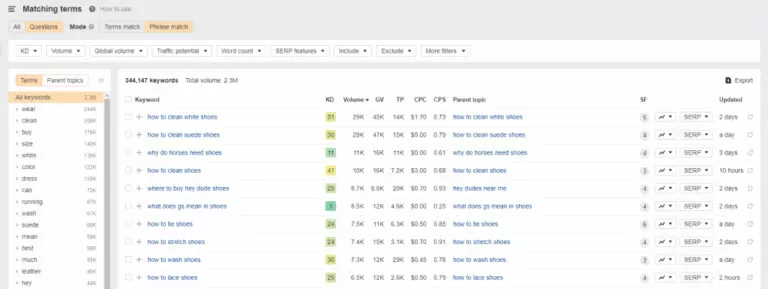
The types of keywords customers use reveal where they are in the sales funnel. Someone searching “DIY furniture tips” isn’t at the same stage as someone searching “Ikea furniture.”
Informational keywords include words like “how,” “what,” and “guide,” for example. The content they’re part of provides users with additional information. So, working with our example, it might be a blog post about “how to build a coffee table.”
By the time the same customer reaches the consideration stage, they’ll use a commercial keyword that signals interest in a product or service like, “DIY vs. IKEA coffee table.” With eCommerce SEO, it’s important to use informational and commercial keywords as they bring in leads that are already at the bottom of the sales funnel and looking to buy.
Content Strategy
Keyword research informs content marketing content. Once we know what your customers are looking for, we’ll develop strategic content that answers their questions along with a strategy that includes topic selection, content format, writing style, design, and promotion.
For example, let’s say you’re an electronics company that sells TVs. Your customers will want to know how to choose the best one without overspending. In other words, they want the best value for money. Therefore, you’d create content that shares information about different models’ pros and cons.
Link Building Strategy
eCommerce stores need strong internal link structures and backlinks from other websites to gain website authority. The former ensures Google crawls all of a website’s web pages, while the latter makes it rank higher.
Link building remains one of the most challenging factors of SEO. We help our clients produce high-quality content informed by keyword research increasing the likelihood of multiple reputable domains linking back to their websites.
After all, it’s much easier to conduct PR and backlink outreach campaigns when your content positions you as an industry leader. We base link building strategies on keyword research and the market to ensure effective and fair budgeting.
UX Audit and Continuous Improvement
Search engines strive to provide the most accurate information to internet users. Yet, algorithm updates and changing consumer behavior influence one another creating a digital landscape that’s always in flux.
Consequently, search engine optimization success relies on monitoring and making adjustments as Google and other search engines become more intelligent and consumers adapt to new digital technologies.
As we’ve mentioned before, SEO is an ongoing process. A professional SEO company like us constantly audits websites, analyzes results and implements improvements for our eCommerce clients. It’s the only way they stay ahead of competitors and achieve perpetual growth.



